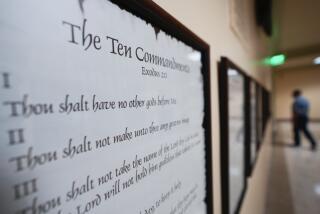Random Verses Don’t Reveal Bible’s Meaning
- Share via
A clever e-mail is kicking around the Internet and finding its way into newspapers and on talk radio shows. It challenges therapist Laura Schlessinger’s view that homosexual acts are immoral because the Bible says so.
The letter starts off nicely enough, agreeing with Schlessinger that homosexuality is a sin (Leviticus 18:22). But then the anonymous author, in mock sincerity, asks the radio talk-show host what to do about seven other obscure laws from the Hebrew Bible. For example:
“I would like to sell my daughter into slavery, as it suggests in Exodus 21:7. In this day and age, what do you think would be a fair price for her?
“I know that I am allowed no contact with a woman while she is in her period of menstrual uncleanliness (Leviticus 15:19-24). The problem is: How do I tell? I have tried asking, but most women take offense.
“I have a neighbor who insists on working on the Sabbath. Exodus 35:2 clearly states he should be put to death. I’ve called the police, but they are unable to help. Am I morally obligated to kill him myself?”
A quick detour: When I first ran the idea of the “Getting Religion” column by my editors almost two years ago, I told them I didn’t plan on ever writing about homosexuality or abortion.
My thinking was this: Religion is so much more than those two topics, though you would hardly know it by examining the news media or looking at bumper stickers.
So this column isn’t about homosexuality, religion or whether Schlessinger is right or wrong. It’s about how in the world to make sense of a book that talks about selling daughters as slaves, putting someone to death for working on the Sabbath and having no contact with menstruating women.
For those answers, I looked up Martin Cohen, a conservative rabbi at Congregation Eilat in Mission Viejo who has received dozens of the Schlessinger e-mails.
“The reason the letter’s funny is because it’s mocking the notion that you can get at the innermost meaning of Scripture by picking verses at random,” Cohen said.
That lack of contextual understanding frustrates Cohen, a scholar of Jewish Scripture and author of nine books, including three Jewish-themed novels.
“It’s so infuriating,” said Cohen, who, by the way, is not a big fan of Schlessinger’s biblical views. “The Torah is not a list of laws like the California driving code. That’s just a collection of rules. There’s no need for context. Each driving rule makes sense on its own.
“You’re constantly having people quote these [biblical] verses to you, but there should be an elaborate footnote on each one.”
Imagine, Cohen said, people reading, 3,000 years from now, random sentences from today’s newspaper.
“People would find it very peculiar,” Cohen said.
Seamless English translations of ancient Hebrew compound the problem. Subtleties are lost, rocky passages smoothed, old meanings hidden. The result is a Bible easier to read but harder to understand.
Cohen uses the word “abomination” as an example. It comes from the Hebrew word “to’evah.” Cohen describes to’evah as a technical term to denote a specific type of offense that someone might not recognize until it’s too late. This sounds much different to our modern-day ears than when someone says, “That’s an abomination in God’s eyes,” which conjures up visions of the Almighty coming down from the heavens with lightning bolts in hand.
“The Bible is an ancient book that reflects the world in which it was first conceived,” Cohen said.
All that, Cohen contends, makes the Bible an easy target for ridicule.
“It’s easy to mock something from the outside,” Cohen, 47, said. “If you cut someone’s liver out and put it on a table, most people would think, ‘What is this mass of decaying flesh?’ They probably wouldn’t guess that it’s a lifesaving organ.”
Let’s get specific. The slavery thing? Cohen said the term “slaves” in the Bible is really better translated “indentured servants,” which was a more enlightened approach to paying off debts than the ancient tradition of throwing borrowers who couldn’t pay into prison. “It’s a huge reform if you view it that way,” Cohen said.
The death penalty for working on the Sabbath? That’s not a literal penalty but an indication to today’s readers just how seriously God takes the Sabbath.
“There are no records of anyone ever being executed,” Cohen pointed out.
And avoiding menstruating women? The background is too complicated to get into here, but if you want to find out what that’s about, Cohen suggests two ways.
First, find a teacher--rabbi, pastor, priest or friend. And second, read Bible-related books. Cohen recommends Jack Miles’ “God: A Biography” for starters.
“The Bible’s been studied intensively,” Cohen said. “To start from scratch is pointless when you can stand on the shoulders of scholars.
“The Bible is really a treasure of riches. But it gives up its secrets very slowly and only to people who devote themselves to its study.”
More to Read
Sign up for Essential California
The most important California stories and recommendations in your inbox every morning.
You may occasionally receive promotional content from the Los Angeles Times.













